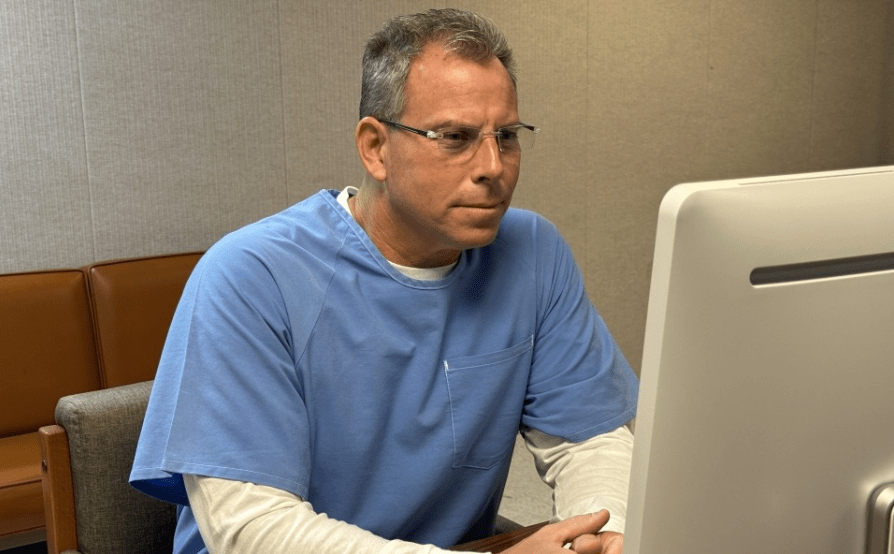Erik Menendez Denied Parole: Board Cites Incomplete Rehabilitation
A hearing panel on Thursday denied parole for Erik Menendez, finding that he has more work to do to rehabilitate himself before he can be released from prison.
The two-person panel acknowledged that Menendez has done good works behind bars, but also stated they were concerned about a long list of rule violations. He can reapply in three years.
“That ability to sort of show one face, but be something else, concerns us,” Commissioner Robert Barton said. “You can grow and mature in some ways, but have blind spots in other areas.”
Menendez was up for parole for the first time since he and has his brother, Lyle, killed their parents at their home in Beverly Hills in 1989. Lyle Menendez is due for his parole hearing on Friday.
The Menendez brothers’ family members have spent years calling for their release. A family spokesperson said Wednesday that they were “cautiously optimistic” that the parole board would see that the brothers have been reformed. After the decision was announced, the family spokesperson said the outcome was “disappointing.”
“We will continue to stand by him and hold to the hope he is able to return home soon,” the spokesperson said.
In a statement to the panel, Erik Menendez offered an apology for killing his parents, Jose and Kitty, saying the murders have inflicted trauma on his family that will endure for generations.
“I just want my family to understand that I am so unimaginably sorry for what I have put them through from Aug. 20, 1989 until this day,” he said. “This should be about them. It’s about them and if I ever get the chance at freedom I want the healing to be about them.”
The parole board evaluates whether inmates who are eligible pose a risk to society if released. Menendez’s parole lawyer, Heidi Rummel, made the case that he does not.
“Mr. Menendez is so far from the person he was when he committed this crime,” she said.
Prosecutor Habib Balian argued that Menendez was saying what he thought the parole board wants to hear, but that he continues to pursue a “false self-defense narrative” about the crimes.
“He’s on the road. He’s not there yet,” Balian said. “He is not reformed. He is still an unreasonable risk to society.”
During the hearing, Barton went through a lengthy list of prison violations, undermining the defense’s argument that the brothers have each been “model inmates.”
Barton cited fights with other inmates, possession of illicit cell phones, drug and alcohol use, a hunger strike and involvement in a tax fraud scheme in association with a prison gang.
“A lot of these things that you’re involved in, you don’t go to the next level to think about what the consequences are,” Barton said.
Menendez was apologetic about the violations, saying he agreed “1000%” with the commissioners’ criticisms.
He also sought to explain his conduct. Menendez said he had “jumped at the opportunity” to participate in the tax fraud scheme — which was not fully explained — as it gave him protection from the gang.
“It was an extremely violent yard that I was trying to survive,” he said.
He also said that using drugs and cooperating with the gang “just made me feel ugly and dirty.” He said he pledged in October 2013 to stop using drugs and to begin living for a “different purpose.”
“I asked myself, ‘Who do I want to be when I die?’” he said. “I believe I’m going to face a different parole board when I die.”
The commissioners seemed particularly focused on his use of cell phones, which continued as recently as last January. Menendez said he paid $1,000 per phone, and would use it to connect with his wife, watch YouTube and pornography, and keep tabs on his case. He said he preferred the cell phone to the jail phone because prison officials could not listen in.
“What I got in terms of the phone and my connection with the outside world was far greater than the consequences of me getting caught with the phone,” he said. “I really became addicted to the phones. You’re doing life without [parole], this is not really harming anyone.”
It was only in November 2024 that he realized he had a real possibility of getting released. At that point he realized that the phone violations meant he was “destroying my life” by risking denial of parole. He said he had since taken a class on criminal thinking and had come to see that phones have a corrupting effect on the prison.
The commissioners also went through the details of the murders, asking Menendez about his state of mind and why the brothers chose to kill their parents rather than flee the situation. Menendez alluded to a history of sexual abuse, though he was precluded from going into great detail.
“It’s difficult to convey how terrifying my father was,” he said. “When I look back at the person I was then, and what I believed about the world and my parents, running away was inconceivable. Running away meant death.”
Barton asked if Menendez believed that “any part of this” was self-defense. He said, “No,” though his lawyer objected to the question. Later, Menendez said that he feared his father was about to rape him that night.
Barton also asked why he killed his mother. Menendez responded once he realized that his mother knew about the abuse, he had come to see that she was united with his father.
“On that night I saw them as one person,” he said.
Barton cut off Menendez at one point as he began to discuss the sexual abuse.
“The purpose of this hearing is not to retry this case,” he said. “Nor is the purpose of this hearing to put your parents on trial.”
At the conclusion of the hearing, Barton said that the decision was primarily influenced by Menendez’s conduct as a prisoner. But he also noted that the murder of Kitty showed Menendez to be “devoid of human compassion” at the time, given that Kitty appears to have been a victim of domestic violence.
He said Menendez was “not in imminent fear” for his life at the time of the murders.
“The truest thing you said in terms of accountability is there is no justification for your actions,” Barton said. “Doing what you did, when you did, how you did it, there is no justification.”
The parole hearing was held remotely via Microsoft Teams. A pool reporter, James Queally of the Los Angeles Times, viewed the hearing and issued reports to the media.
Judge Michael Jesic resentenced the brothers in May to 50 years to life in prison, giving them the opportunity to seek parole. The decision came eight months after George Gascón, the former Los Angeles district attorney, petitioned the court to resentence them, saying they deserved a chance at freedom.
The Menendez case reemerged in public consciousness last year after the premiere of the popular Netflix drama series, “Monsters: The Lyle and Erik Menendez Story.”

